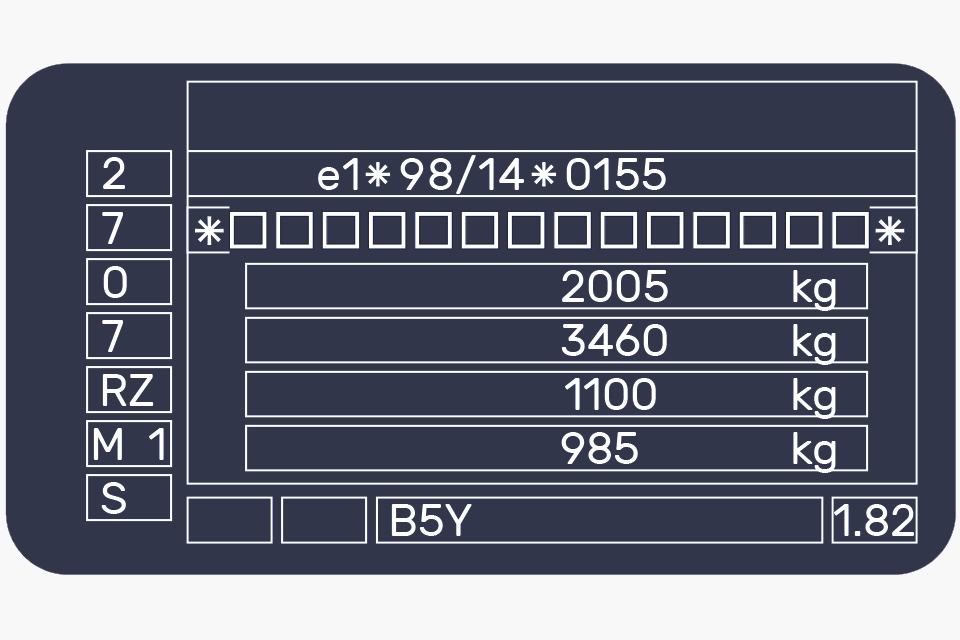Depending on their weight and beam it’s possible to tow boats of up to around 30ft length and three tonnes displacement with your own vehicle. However, even with a lightweight dinghy it’s easy to fall foul of the law. Here’s a run down of the most important points for those towing a boat in the UK, plus some top tips for safe boat towing.
UK law doesn’t specify a relationship between the weight of a towing vehicle and the weight of a trailer with a maximum laden weight under 3,500kg. However manufacturers of cars and other vehicles designed for carrying fewer than eight passengers specify a maximum permissible trailer weight. This usually assumes the towing vehicle is carrying only the driver and a full tank of fuel. A Gross Train Weight may also be given, in which case neither the overall weight of the car plus trailer combination, nor the towing weight, should be exceeded.
The RAC, however, recommends lower limits, advising drivers not to tow a weight greater than 85 per cent of the kerb weight of their towing vehicles, which is normally significantly lower than manufacturers’ maximum figures. The risk of towing a greater weight is the trailer is more likely to take control, causing either snaking or jack-knifing. If snaking occurs, ease off the accelerator (or brake) until the trailer stabilises. Jack-knifing is usually the result of braking too hard while turning a corner.
In practical terms it can be very difficult to figure out the exact weight of a boat a trailer combination – many craft were significantly heavier than the boat builder’s figures when then left the factory. Also don’t forget to factor in additional weight of the trailer, spares, tools, extras such as ground tackle, outboard engines and your own personal kit – these can easily add up to 50 per cent of the weight of the boat. If you are at all unsure of the overall weight, take the outfit to your nearest public weighbridge.
The rules on what you can tow are different depending on when you passed your driving test.

There are checks you should carry out every time you tow a trailer with a car, to make sure you’re towing safely and legally.
Checks before you tow
Carry out the basic safety checks shown in this video to make sure that your vehicle and trailer are safe and legal.
Towing a trailer with a car: basic safety checks
You can be fined up to £2,500, be banned from driving, and get 3 penalty points for using a vehicle in a dangerous condition.
Tow ball and connections
Check that:
- the trailer is correctly coupled to the towball or pin – follow the manufacturer’s advice
- the coupling height is correct
- the 7 or 13 core cable and plug is not damaged
Breakaway cable
Use a breakaway cable or secondary coupling. This engages the trailer’s brakes (if fitted) or stops the trailer if it becomes detached from the car.
Check that:
- the cable is not worn or damaged
- there’s enough slack in the cable so that it does not accidentally apply the brakes
- the cable will not drag on the ground when you’re driving
Follow the manufacturer’s advice to make sure it’s connected correctly.
Wheels and tyres
Check that the tyres on both the car and trailer:
- do not have any cuts or bulges
- are inflated to the manufacturer’s specification for the load being carried
Check that each tyre has a tread depth of at least 1.6mm:
- across the central three-quarters of the breadth of the tread
- around the entire circumference of the tyre
Check that the wheel nuts and bolts are tightened to the correct torque.
Check that mudguards are fitted to the trailer and they’re secure.
Lights and indicators
Check that there’s no damage to the lights, and that they’re all working correctly.
Load and weight limit
Check that:
- the trailer is not overloaded
- the load is distributed evenly
- the load is secure
Find your car’s weight limit
The vehicle manufacturer’s plate gives information about weight limits for your car. Check the car’s handbook if a plate is not fitted.

| Weight | Description |
|---|---|
| Weight 1 | Maximum weight of the car on its own |
| Weight 2 | Maximum weight of the car and trailer combined |
| Weight 3 | Maximum weight for the front axle of the car |
| Weight 4 | Maximum weight for the rear axle of the car |
The maximum weight includes passengers, other loads, and fuel.
Trailer with no braking system
The loaded trailer:
- must not weigh over 750kg
- should not weigh more than 50% of your car’s weight
Trailer with braking system
The car and loaded trailer must not weigh over the second weight shown on the car manufacturer’s plates.
When you’re driving
You must not drive faster than the speed limit for the type of road you’re on.
If the trailer starts to snake or swerve, ease off the accelerator and reduce your speed gently. It’s a sign that either:
- you’re going too fast
- the trailer is loaded incorrectly
Do not brake harshly on a bend, as it makes the trailer unstable. Reduce your speed in plenty of time when approaching any hazard.
Motorways
You must not drive in the right-hand lane of a motorway with 3 or more lanes.
Get a free safety check
You can get a free safety check for a trailer up to 3,500kg through the National Trailer and Towing Association’s (NTTA) free safety checks scheme.
The check will highlight issues that you need to address.
More information
The NTTA guide to safe and legal towing gives detailed information about:
- attaching the trailer to the vehicle
- driving with a trailer
- maintaining a trailer
You can also order ‘Trailer towing guidance and the law’ from the Society of Motor Manufacturers and Traders.












